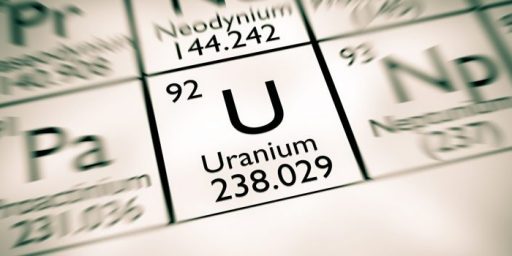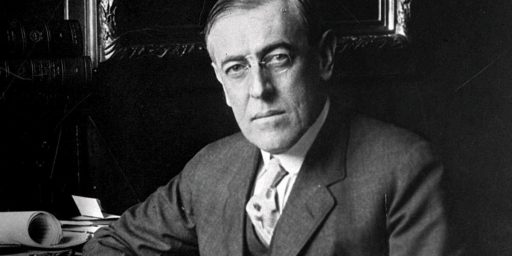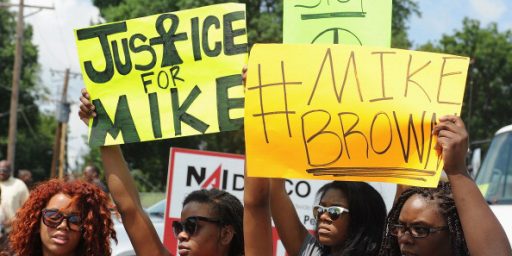Sixteen Truthful Words
Bill Safire‘s column today [RSS] is entitled, “Sixteen Truthful Words.”
But when word leaked about the fake documents — which were not the basis of the previous reporting by our allies — Wilson launched his publicity campaign, acting as if he had known earlier about the forgeries. The Senate reports that in his misleading anonymous leak to The Washington Post, “He said he may have misspoken . . . he said he may have become confused about his own recollection. . . .” The subsequent firestorm caused the White House to retreat prematurely with: “the sixteen words did not rise to the level of inclusion in the State of the Union address.”
That apology was a mistake; Bush had spoken the plain truth. Did Saddam seek uranium from Africa, evidence of his continuing illegal interest in a nuclear weapon? Here is Lord Butler’s nonpartisan panel, which closely examined the basis of the British intelligence:
“. . . we conclude that the statement in President Bush’s State of the Union Address of 28 January 2003 that `The British Government has learned that Saddam Hussein recently sought significant quantities of uranium from Africa’ was well-founded.”
A bit behind the blog curve but correct all the same.
Michael Barone is more to the point with his piece, “The ‘Bush Lied’ folks can’t be taken seriously.”
As the Brookings Institution’s Michael O’Hanlon — a frequent Bush critic — puts it, “It would have taken an overwhelming body of evidence for any reasonable person in 2002 to think that Saddam did not possess stockpiles of chemical and biological agents.” So Bush was justified in relying on the intelligence. And “the committee did not fund any evidence that administration officials attempted to coerce, influence or pressure analysts to change their judgments related to Iraq’s weapons of mass destruction capabilities.” So much for the wild charges that Bush manipulated intelligence and lied about weapons of mass destruction. He simply said what was believed by every informed person — including leading members of the Clinton administration before 2001 and Sens. John Kerry and John Edwards in their speeches in October 2002 supporting military action in Iraq.
***
All this is significant because for the past year most leading Democrats and many in the determinedly anti-Bush media have been harping on the “BUSH LIED” theme. Their aim clearly has been to discredit and defeat Bush. The media continue to fight this battle: contrast the way The New York Times, The Washington Post and the Los Angeles Times front-paged the Wilson charges last year with the way they’re downplaying the proof that Wilson lied deep inside the paper this year.
Yale historian John Lewis Gaddis has argued that George W. Bush has transformed American foreign policy, in response to the threat of Islamist terrorism, more than any president since Harry Truman transformed our foreign policy in response to the threat of aggressive communism. But there is one big difference. In the late 1940s, Truman got bipartisan support from Republicans like Arthur Vandenberg and Thomas Dewey, even at a time when there were bitter differences between the parties on domestic policy, and received generally sympathetic treatment in the press. This time, George W. Bush has encountered determined opposition from most Democrats and the old-line media. They have charged that “BUSH LIED” even when he relied on the same intelligence as they did; they have headlined wild and spurious charges by the likes of Joseph Wilson; they have embraced the wild-eyed propaganda of the likes of Michael Moore. They have done these things with, at best, reckless disregard of the effect their arguments have had on American strength in the world. Are they entitled to be taken seriously?
So far, the Big Lie seems to be working on this one, though. The retractions aren’t getting nearly the attention that the drumbeat of lies got and the impression that Bush got us into the war on the basis of lies is now received wisdom, despite a steady flow of evidence to the contrary.
Update: Also rather late to the show, the AP has more:
Philadelphia Inquirer (AP) – Hussein may have sought uranium
Bush said the Iraqi leader was buying it, then repudiated his remarks. New reports say he may not have been wrong.
It was one of the first signs that the intelligence used to go to war in Iraq was wrong: White House repudiation of 16 words in last year’s State of the Union speech that had suggested Saddam Hussein tried to buy uranium in Africa. Yet even as two recent reports sharply criticized prewar intelligence, they also suggested President Bush’s claim may not have been totally off-base.
A British report concluded that Bush’s statement and a similar one by Prime Minister Tony Blair were “well-founded.” In his speech, Bush had attributed the uranium claim to the British government. A Senate intelligence committee report found inadequate evidence that deposed Iraqi President Saddam Hussein had been rebuilding his nuclear-weapons program. It cited various reports, however, that Iraq had sought uranium in Africa. The committee chairman, Sen. Pat Roberts, said he believed last year that the White House was correct in repudiating the uranium claim. “Now I don’t know whether it’s accurate or not.”





My understanding is that Lord Butler said that it was reasonable to conclude that Saddam tried to buy uranium in Niger, and that there was evidence of this outside of the faked documents. He did not say they had conclusive proof however. Some of these articles responding to Butler’s report are reading more into the report than is there in that they are essentially concluding without doubt that Saddam tried to do this and that alone was cause for war. Maybe, maybe not? A lot more investigation and understanding of the evidence and its ramifications need to be understood to conclude that. Lord Butler’s report doesn’t provide much in the way of details that would be helpful to so conclude. So in some ways, Butler’s report on this matter may lead credence to the argument that this was another instance that there was a rush to war without fully getting the evidence of a real and timely threat. And this is pretty much what Bush said: he wasn’t going to sit around and wait to put together a “slam dunk” case. Bush made a policy choice about the threshold of going to war that can certainly be discussed, but it’s unlikely he was a bold-faced liar as some accuse.
I suspect that its partisan “journalism” striking again. In any case, the report is nonetheless helpful to the president on the issue because it helps counter the “Bush Lied” argument.
Two items are still puzzling though:
1. Assuming Saddam did try and buy the yellowcake, what was he planning on doing with it? It has now pretty much been concluded that Saddam had no nuclear weapons program (yes there were some plans for one found, but no evidence that anything had been put in place or even started). So Saddam having this material would be of no use to him directly since he would need a lot of sophisticated equipment to process it. Maybe he was planning to sell it to another country who had the technology to process it. But the countries likely to buy it already have sophisticated nuclear programs where the yellow cake would have been child’s play (North Korea, Pakistan). Maybe terrorist’s could use it to turn it into a dirty bomb? I don’t know whether this is technologically possible or likely, and so far there is no “slam dunk” connections between Saddam and terrorists. In some ways, more questions are raised by Lord Butler’s report on this subject than answered.
2. If the intelligence community had reasonable evidence tha Saddam did this (outside of the faked documents of course), why then did the Bush administration come out so strongly and say that it was absolutely wrong for them to have included the reference in the state of the union speech. I don’t recall the words exactly when they retracted the yellowcake point, but the Bush administration’s words left little doubt that Saddam did not try to buy the yellowcake.
Maybe this was another example of the left hand of the Bush administration not knowing what the right hand was doing. In other words, one scenario that can be imagined is that when Wilson created a media feeding frenzy, Rove said the only way to stop it was to come out and say the speech was wrong (yet they did this without making sure that was the case). In any case, it’s perplexing and worrisome that the Bush administration seems so confused on this issue.